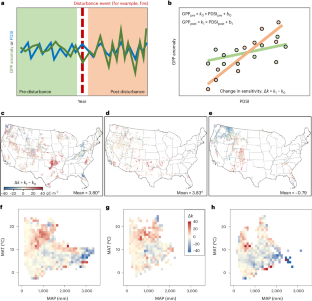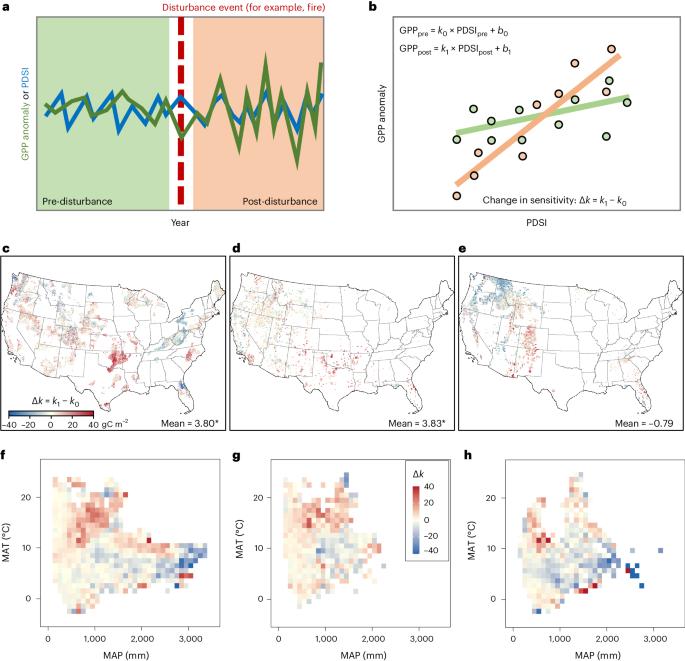Climate-driven disturbances amplify forest drought sensitivity
IF 29.6
1区 地球科学
Q1 ENVIRONMENTAL SCIENCES
引用次数: 0
Abstract
Forests are a major terrestrial carbon sink, but the increasing frequency and intensity of climate-driven disturbances such as droughts, fires and biotic agent outbreaks is threatening carbon uptake and sequestration. Determining how climate-driven disturbances may alter the capacity of forest carbon sinks in a changing climate is crucial. Here we show that the sensitivity of gross primary productivity to subsequent water stress increased significantly after initial drought and fire disturbances in the conterminous United States. Insect outbreak events, however, did not have significant impacts. Hot and dry environments generally exhibited increased sensitivity. Estimated ecosystem productivity and terrestrial carbon uptake decreased markedly with future warming scenarios due to the increased sensitivity to water stress. Our results highlight that intensifying disturbance regimes are likely to further impact forest sustainability and carbon sequestration, increasing potential risks to future terrestrial carbon sinks and climate change mitigation. The authors quantify how climate change-related disturbances—drought, fires and insect outbreaks—impact the sensitivity of primary productivity to subsequent water stress. They show significant increases in sensitivity following drought and fire, leading to decreased terrestrial carbon uptake.


气候驱动的扰动加剧了森林对干旱的敏感性
森林是主要的陆地碳汇,但干旱、火灾和生物制剂爆发等由气候引起的干扰的频率和强度不断增加,威胁着碳的吸收和固存。确定气候驱动的干扰如何在不断变化的气候中改变森林碳汇的能力至关重要。在这里,我们表明,在美国中部地区,最初的干旱和火灾扰动之后,总初级生产力对随后的水分胁迫的敏感性显著增加。然而,昆虫爆发事件的影响并不大。炎热和干旱环境的敏感性普遍提高。由于对水胁迫的敏感性增加,估计的生态系统生产力和陆地碳吸收量随着未来气候变暖而明显下降。我们的研究结果突出表明,干扰机制的加剧可能会进一步影响森林的可持续性和碳吸收,增加未来陆地碳汇和减缓气候变化的潜在风险。
本文章由计算机程序翻译,如有差异,请以英文原文为准。
求助全文
约1分钟内获得全文
求助全文
来源期刊

Nature Climate Change
ENVIRONMENTAL SCIENCES-METEOROLOGY & ATMOSPHERIC SCIENCES
CiteScore
40.30
自引率
1.60%
发文量
267
审稿时长
4-8 weeks
期刊介绍:
Nature Climate Change is dedicated to addressing the scientific challenge of understanding Earth's changing climate and its societal implications. As a monthly journal, it publishes significant and cutting-edge research on the nature, causes, and impacts of global climate change, as well as its implications for the economy, policy, and the world at large.
The journal publishes original research spanning the natural and social sciences, synthesizing interdisciplinary research to provide a comprehensive understanding of climate change. It upholds the high standards set by all Nature-branded journals, ensuring top-tier original research through a fair and rigorous review process, broad readership access, high standards of copy editing and production, rapid publication, and independence from academic societies and other vested interests.
Nature Climate Change serves as a platform for discussion among experts, publishing opinion, analysis, and review articles. It also features Research Highlights to highlight important developments in the field and original reporting from renowned science journalists in the form of feature articles.
Topics covered in the journal include adaptation, atmospheric science, ecology, economics, energy, impacts and vulnerability, mitigation, oceanography, policy, sociology, and sustainability, among others.
 求助内容:
求助内容: 应助结果提醒方式:
应助结果提醒方式:


